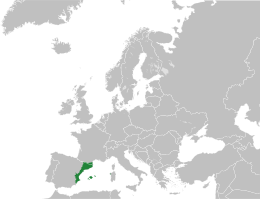North-Western Catalan
| Catalan | |
|---|---|
| Catalan–Valencian–Balearic | |
| català | |
| Pronunciation |
[kətəˈla] (Eastern) ⁓ [kataˈla] (Western) |
| Native to | Andorra, France, Italy, Spain |
|
Native speakers
|
4.0 million (2012) L2 speakers: 5.1 million in Spain (2012) |
|
Early form
|
|
|
Standard forms
|
Catalan (regulated by the IEC)
|
|
Latin (Catalan alphabet) Catalan Braille |
|
| Signed Catalan | |
| Official status | |
|
Official language in
|
1 country
1 organisation
|
|
Recognised minority
language in |
|
| Regulated by |
Institut d'Estudis Catalans Acadèmia Valenciana de la Llengua |
| Language codes | |
| ISO 639-1 | ca |
| ISO 639-2 | |
| ISO 639-3 | |
| Glottolog | stan1289 |
| Linguasphere | 51-AAA-e |
 |
|
Catalan (/ˈkætəlæn/;autonym: català [kətəˈla] or [kataˈla]) is a Romance language derived from Vulgar Latin and named after the medieval Principality of Catalonia, in northeastern modern Spain and adjoining parts of France. It is the national and only official language of Andorra, and a co-official language of the Spanish autonomous communities of Catalonia, the Balearic Islands, and Valencia (where the language is known as Valencian, and there exist regional standards). It also has semi-official status in the commune of Alghero, situated on the northwestern coast of the island of Sardinia (Italy), where a variant of it is spoken. It is also spoken with no official recognition in parts of the Spanish autonomous communities of Aragon (La Franja) and Murcia (Carche), and in the historic region of Roussillon/Northern Catalonia, roughly equivalent to the department of Pyrénées-Orientales in modern France. All these territories are often called Catalan Countries.
...
Wikipedia
